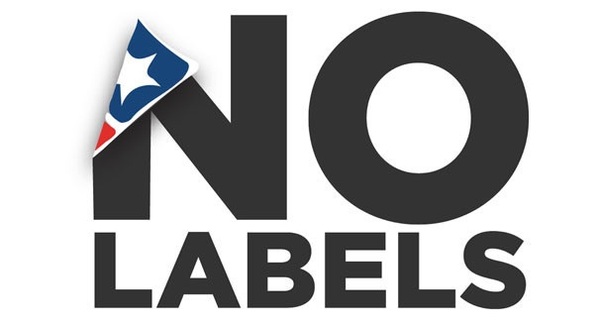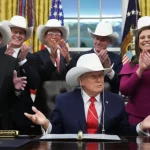
(function(d, s, id) { var js, fjs = d.getElementsByTagName(s)[0]; if (d.getElementById(id)) return; js = d.createElement(s); js.id = id; js.src = “https://connect.facebook.net/en_US/sdk.js#xfbml=1&version=v3.0”; fjs.parentNode.insertBefore(js, fjs); }(document, ‘script’, ‘facebook-jssdk’)); –>
–>
October 10, 2023
A Gallup poll published on October 4, 2023 should serve as a wake-up call to both the Democrat and Republican Parties as well as their prospective presidential nominees in 2024.
‘); googletag.cmd.push(function () { googletag.display(‘div-gpt-ad-1609268089992-0’); }); document.write(”); googletag.cmd.push(function() { googletag.pubads().addEventListener(‘slotRenderEnded’, function(event) { if (event.slot.getSlotElementId() == “div-hre-Americanthinker—New-3028”) { googletag.display(“div-hre-Americanthinker—New-3028”); } }); }); }
A massive 63% of those polled told Gallup they agree with the premise that the Republican and Democratic Parties do such a poor job of representing the American people that a third major party is necessary. 46% of Democrats and a whopping 76% of Independents believe a third party is needed.
The change among Republican voters claiming the need for a third party is the most significant revelation of this poll. As of October of 2023, 58% of Republicans believe a third party is a necessity. That is up 13 points from last year when Donald Trump’s announced he would run for a second term. In the normal course of events, once Trump got into the race the percentage of Republicans agreeing that at third party was needed should have receded not increased. During Trump’s four years in office an average of only 39% of Republicans agreed that a third party was needed.
Much of this reaction among the general populace is due to three factors. First, the unpopularity of both Trump (57% unfavorable) and Biden (54% unfavorable). Second, the Democrat Party’s pursuit of far-left policies that alienate a majority of voters. And third, the Republican Party’s fecklessness in dealing with the Democrat Party’s extremism while publicly airing out their internal squabbles like children on a school playground.
‘); googletag.cmd.push(function () { googletag.display(‘div-gpt-ad-1609270365559-0’); }); document.write(”); googletag.cmd.push(function() { googletag.pubads().addEventListener(‘slotRenderEnded’, function(event) { if (event.slot.getSlotElementId() == “div-hre-Americanthinker—New-3035”) { googletag.display(“div-hre-Americanthinker—New-3035”); } }); }); }
This Gallup poll is not an outlier. Another recent poll exposes the potential impact of a third party vote on the outcome of the 2024 election.
In eight all-important battleground states that will decide the 2024 election, a majority of the registered voters polled said they would back a third-party candidate if the 2024 election features a rematch between Joe Biden and Donald Trump.
Overall, 63% claim they would be open to supporting a centrist independent ticket. 72% believe Biden should not win a second term (which is among the many reasons he will not be on the ballot in November of 2024), while 63% say Trump should not win a second term. This opens the door for an alternative candidate to garner significant votes in the general election. A third party candidate cannot win in any of these states, but they will have a major impact on who does.
The Libertarian Party is extraordinarily bullish on their ability to achieve major inroads among the electorate in 2024 and make an Electoral College breakthrough for the first time in their 50-year history. Their confidence is exemplified by their 2020 vice-presidential nominee, Spike Cohen, who when asked about splitting the 2024 vote said:
Libertarians intend to take so many votes from Republicrats that neither of their candidates can win, and we win instead. If we fall short of that, we will still have a major impact. And if they want so many voters to stop voting for us, they should put up candidates that suck less.
The Libertarian Party’s impact on not only the Republican presidential ticket but down ballot elections as well cannot be underestimated. In 2020,  Trump lost Arizona, Georgia, and Wisconsin (and thus the presidency) by a combined 42,000 votes, the Libertarian candidate garnered 153,000 votes in those states and 2024 projects to be a far better year for third-party candidates.
Trump lost Arizona, Georgia, and Wisconsin (and thus the presidency) by a combined 42,000 votes, the Libertarian candidate garnered 153,000 votes in those states and 2024 projects to be a far better year for third-party candidates.
‘); googletag.cmd.push(function () { googletag.display(‘div-gpt-ad-1609268078422-0’); }); document.write(”); googletag.cmd.push(function() { googletag.pubads().addEventListener(‘slotRenderEnded’, function(event) { if (event.slot.getSlotElementId() == “div-hre-Americanthinker—New-3027”) { googletag.display(“div-hre-Americanthinker—New-3027”); } }); }); } if (publir_show_ads) { document.write(“
Among those factors is the emergence of the No Labels Party, which is intent on nominating an alternative “centrist ticket.” Thus far they have ballot access in ten states, including the battleground states of Arizona, North Carolina, and Nevada and will be filing petitions in additional states.
The No Labels Party is planning to choose a candidate at their convention in April of 2024 but names such as ex-governor Larry Hogan (R-Maryland), ex-governor Jon Huntsman (R-Utah) and Senator Joe Manchin (D-West Virgina) have been bandied about as potential nominees.
Another name that could be added to the list is Robert F. Kennedy, Jr. who recently announced his intention to run as an independent. He will have enormous difficulty gaining ballot access as an independent but he could consider the No Labels Party as an alternative. The consensus is he would siphon more votes from Trump than Biden as he has become the darling of many populist-leaning voters.
The Green Party will nominate a candidate at its convention. Cornel West, who was planning on running as the Green Party candidate, has dropped out, claiming he will run as an independent leaving the party with a list of eight unknown candidates. As the Party invariably siphons votes from the Democrat candidate, there appears to be little enthusiasm among the Green Party hierarchy to promote their ultimate nominee as defeating Trump is their main objective in 2024.
The resurgence of interest in a third party by a majority of Americans is also a reaction to the self-aggrandizement, incompetence, and avarice on display almost daily by members of both parties as Congress has evolved into an institution of near-permanent tenure for its members.
Chief among the complaints of many Americans who clamor for a third party is that Congress is run by “the Uniparty.” There is a Uniparty because once elected the bulk of House and Senate members have little fear of being defeated for re-election, thus, their common and overriding interest is enriching themselves, fundraising, and satisfying their financial backers.
This process evolved over many decades due to a large segment of voters choosing not to vote in primaries. Among Republican far too many opt to remain on the sidelines throw stones and complain rather than affect change. The typical turnout for a primary around 30%. The result of this indifference: since 1962 (30 election cycles) the average re-election rate per cycle for incumbents has been nearly 94%.
This unrest among the electorate and their desire for a major third party portends a threat to both major parties, but in particular the Republican Party. The bulk of third-party angst is aimed at the Republicans, potentially leaving the now Marxist-controlled Democrat Party in the position of assuming near total and permanent hegemony within the halls of government.
It will take at least a decade for a third party to supplant the Republican Party as one of the two national parties. In the meantime, the Democrats will have achieved their goal of transforming America into an enfeebled one-party socialist nation.
Historically third parties have had little impact on American elections. However, a significant vote for a third party in 2024 will result in the Democrats winning the White House and at least one if not both chambers of Congress.
Which begs the question: what is the Republican Caucus in the House and Senate, the Republican National Committee, and Donald Trump doing to convince Americans to not vote for a third party?
Image: No Labels
<!–
–>
<!– if(page_width_onload <= 479) { document.write("
“); googletag.cmd.push(function() { googletag.display(‘div-gpt-ad-1345489840937-4’); }); } –> If you experience technical problems, please write to [email protected]
FOLLOW US ON
<!–
–>
<!– _qoptions={ qacct:”p-9bKF-NgTuSFM6″ }; ![]() –> <!—-> <!– var addthis_share = { email_template: “new_template” } –>
–> <!—-> <!– var addthis_share = { email_template: “new_template” } –>





